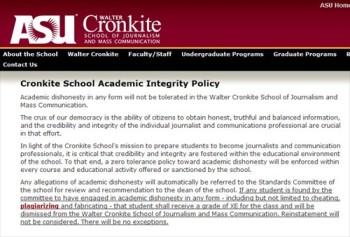
(Credit: ASU, screenshot)
This month, Arizona State University’s student newspaper the State Press apologized for plagiarism by one of its reporters, Raquel Velasco, and Arizona newspaper the East Valley Tribune apologized for plagiarism by an unnamed ASU student intern, as we have written.
We wrote to ASU asking if the school had taken any action against the student, since the Tribune noted that it contacted the school about the plagiarism.
We heard back from Kristin Gilger, the associate dean of Arizona State University’s Walter Cronkite School of Journalism and Mass Communication. Gilger told us by email that “universities are prevented under the federal Family Educational and Privacy Act from discussing the academic record of any student” but directed us to the journalism school’s “academic integrity policy” and “integrity pledge.” Gilger added that “Every Cronkite student in every class must read and sign the pledge. ”
The “Academic Integrity Policy” notes that
“Any allegations of academic dishonesty will automatically be referred to the Standards Committee of the school for review and recommendation to the dean of the school. If any student is found by the committee to have engaged in academic dishonesty in any form – including but not limited to cheating, plagiarizing and fabricating – that student shall receive a grade of XE for the class and will be dismissed from the Walter Cronkite School of Journalism and Mass Communication. Reinstatement will not be considered. There will be no exceptions.”
The school’s “Academic Integrity Pledge,” which was “updated” this fall, says that plagiarism and fabrication break “two of the most important standards we uphold as journalists” and advises students to either “quote and attribute” or “paraphrase and attribute.” Attribution is required under the pledge unless it’s “common knowledge,” “background information,” or “observation.” The pledge also instructs students regarding press releases, writing that “the rules of attribution apply.”
Further, the pledge says that it treats all plagiarism the same if it was “intentionally” done or not and defines plagiarism as
“using someone else’s words, phrases, sentences or ideas without giving credit. This is true whether you do it intentionally or inadvertently.”
The guidelines also instruct on attribution, plagiarism and fabrication in multimedia.







No matter what we may think of her lack of integrity, “academic dishonesty” is the operative phrase for Ms. Velasco’s situation.So far as has been made public, she did not plagiarize work for any of her courses. Therefore, as scandalous as Ms. Velasco’s plagiarism may be, there is a clear distinction between “academic dishonesty” and the known instances of plagiarism she has committed.Ms. Velasco’s work on the State Press newspaper was not part of a course (the State Press is an independent student-run publication), therefore her dishonesty does not fall into the category of “academic dishonesty.”The same can be said for any other manufactured works she may have created for non-ASU organizations.